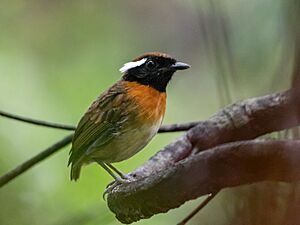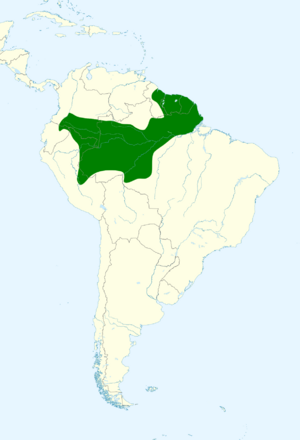Chestnut-belted gnateater facts for kids
Quick facts for kids Chestnut-belted gnateater |
|
|---|---|
 |
|
| In Novo Airão, Amazonas, Brazil | |
| Conservation status | |
| Scientific classification |
|
| Kingdom: | Animalia |
| Phylum: | Chordata |
| Class: | Aves |
| Order: | Passeriformes |
| Family: | Conopophagidae |
| Genus: | Conopophaga |
| Species: |
C. aurita
|
| Binomial name | |
| Conopophaga aurita (Gmelin, JF, 1789)
|
|
| Subspecies | |
|
See text |
|
 |
|
| Script error: The function "autoWithCaption" does not exist. | |
Script error: No such module "Check for conflicting parameters".
The chestnut-belted gnateater (Conopophaga aurita) is a small, colorful bird that lives in the Amazon Basin of South America. It's part of a bird family called gnateaters, known for eating insects. You can find this bird in northern Brazil, southern Colombia, eastern Peru, and Ecuador. It also lives in countries like Guyana, Suriname, and French Guiana. These birds prefer to live in warm, wet forests close to the ground.
Contents
About the Chestnut-belted Gnateater
How Scientists Named This Bird
The chestnut-belted gnateater was first officially described in 1789. A German scientist named Johann Friedrich Gmelin gave it its first scientific name. He put it in the same group as thrushes, calling it Turdus auritus.
Later, in 1816, a French bird expert named Louis Pierre Vieillot created a new group just for gnateaters. This group is called Conopophaga. The chestnut-belted gnateater is the main example for this group.
The name Conopophaga comes from Ancient Greek words. Kōnōps means "gnat," and -phagos means "-eating." So, it means "gnat-eating." The second part of its name, aurita, comes from Latin. It means "eared" or "long-eared."
Different Types of Chestnut-belted Gnateaters
Scientists recognize four slightly different types, or subspecies, of the chestnut-belted gnateater:
- C. a. inexpectata Zimmer, JT, 1931 - Found in parts of Colombia and Brazil.
- C. a. aurita (Gmelin, 1789) - Also found in Colombia and Brazil.
- C. a. occidentalis Chubb, 1918 - Lives in the Guianas and northeast Brazil.
- C. a. australis Todd, 1927 - Found in eastern Peru and southwest Amazonian Brazil.
What Does This Bird Look Like?
The chestnut-belted gnateater is a small, dark bird. It has a strong bill, which is its beak. Its upper body and the top of its head are brown. Sometimes, the top of its head has a reddish-brown tint.
It has a white stripe above its eye, called a supercilium. Its legs are a pinkish-grey color.
Male vs. Female Gnateaters
- Males: Have a black area on their forehead, face, and throat. Their chest is a reddish-brown color (rufous). Their belly is usually a pale yellow-brown (buff) or white.
- Females: Have a reddish-brown (rufous) face, throat, and chest. Their belly is also pale yellow-brown (buff) or white.
Some male gnateaters from certain subspecies look a bit different. For example, in the snethlageae and pallida subspecies, the black on their face and throat extends further down onto their chest. This means the reddish-brown part on their belly is smaller.
Where Do Chestnut-belted Gnateaters Live?
This bird lives all across the Amazon Basin, which is the large area around the Amazon River. It covers the southern half of the Amazon Basin but does not go into Bolivia.
In the west, you can find it in eastern and northeastern Peru. It also lives in parts of northeast Ecuador and southern Colombia. The Rio Negro river forms a boundary in the west and northwest. This bird is not found in the north-central Amazon Basin, like most of Brazil's Roraima state.
In the northeast, beyond where the Amazon River flows into the ocean, its range continues through Amapá state. It extends into the Guianas all the way to the Atlantic coast. It also lives in the central and eastern Guiana Shield, but only in eastern Guyana.
 | Jewel Prestage |
 | Ella Baker |
 | Fannie Lou Hamer |


